






Mental wellbeing at work
‘Pandemic fatigue’ kicks in as 25% of employees feel badly about their work
Insights
Insights
The loss of Queen Elizabeth and Mikhail Gorbachev
For praying, they threw him naked into a cold cell for four days without food or water 23
EU.Review 28
Over a Coffee with Anthony Gatt 31
Artist Fabio Borg makes comeback with new collection of abstract landscapes 36
The Malta Institute of Accountants launches second edition of #AccountsForYou awareness campaign 39
Malta’s ‘massive’ disadvantages could push cost of goods higher 41 Treat talent as scarcer than capital 43
Editorial Team
Managing Editor - Jesmond Saliba
Contributors
Anthony Gatt, CEO, Caritas Joanne Bondin, Director, MISCO Consuela Barbara, Director of HR, McDonald’s
Isabelle Micallef Bonello
James Vella Clark Keith Zahra Matthew Borg Nicholas Azzopardi Shirley Zammit Tonio Galea
 STORY
STORY
Mental wellbeing depends on a unique mix of personality traits that are mostly genetic in nature, but then there is also our upbringing with family, school, friends, neighbours, and colleagues which affects us. Therefore, although there are people with a genetic predisposition to develop depression and anxiety, a person who as a child grows in an unsafe critical environment might also be battered down and impacted by the cultural and societal environment, in which they grow up.
There will however always be people who struggle with all sorts of problems – from addictions, emotional or financial difficulties, solitude and separation to poverty, homelessness, health conditions and bereavement. Many just cannot cope with the stress and eventually, what they would think is a solution, turns out to be a much bigger and overwhelming problem
Over the past few years, especially since the onset of the global COVID pandemic, the common discourse surrounding the topic of mental health has increasingly been dealing mostly with the importance of safeguarding mental wellbeing in the workplace. However, when looking at this topic, we are increasingly having to face the fact that being content and serene at work is not enough. Half of our
lives is beyond our place of work and societal factors such as culture, politics and country policies interact and impact a person’s wellbeing as much as stress at work does.
After all, even Sigmund Freud described a psychologically healthy life as being that where one is engaged both in work and in significant relationships in a way that a person lives a balanced life.
“There will however always be people who struggle with all sorts of problems – from addictions, emotional or financial difficulties, solitude and separation to poverty, homelessness, health conditions and bereavement. Many just cannot cope with the stress and eventually, what they would think is a solution, turns out to be a much bigger and overwhelming problem,” says Anthony Gatt, CEO of Caritas.
At Caritas, an organisation that has been supporting individuals through social work, counselling interventions and support groups for over 37 years, Anthony Gatt faces society’s problems every day.
“Although we assist and support individuals with problems, the bigger problem is no longer an individualistic one but a societal one. Yes, it is true that in Malta, we are still lucky enough to have systems in place such as free healthcare and support, but we also need to face the fact that the challenges that our society is facing are deteriorating challenges that are affecting our collective mental health.”
“Overpopulation, reduced green areas, the widening gap between rich and poor, the strains for low-income families, rich families who live an unsustainable lifestyle – these are all situations that are contributing to a deterioration of our overall mental health and wellbeing,” he explains.
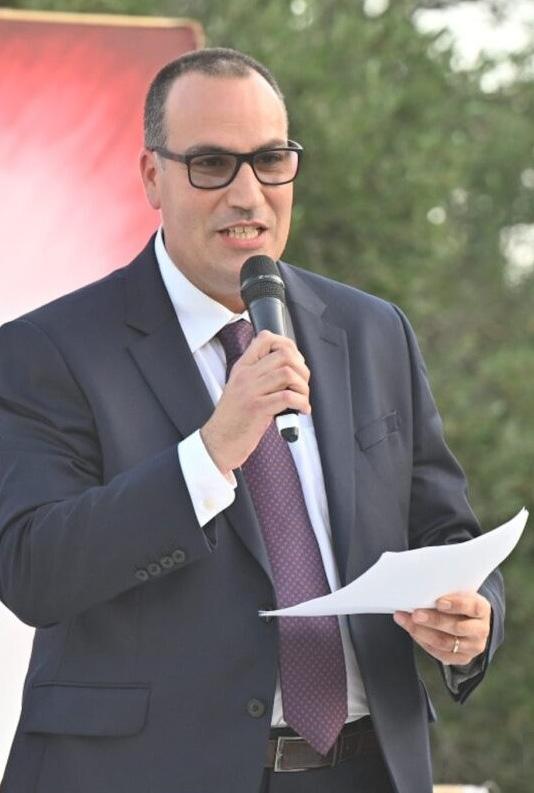
This is where nurture comes in – because an individual is as strong as his or her upbringing.
“Whereas society will never cease throwing challenges at us, our problem lies in the fact that we are not raising resilient future generations. Reports from teachers at schools show us that children seem to be less resilient in coping with normal life’s stresses. As a result, anxiety is on the increase in both children and young adults, and it is becoming increasingly harder to engage children because of their short attention spans. This, in turn, brings added anxiety at the family level which in turn affects the working parents who carry their problems to work. It’s a vicious cycle.”
Anthony Gatt explains how he witnesses families struggling in a range of ways mostly with regards to parenting and that the children who are struggling most are the ones who lack discipline, parental attention and positive control.
“Today’s children are left to their own devices. Literally. Their parents or carers are too busy with work because they need to cope with life’s demands, which are often dictated by societal expectations. Children are growing up having it easy and pampered by parents who are often anxious and not capable of coping with life. So children are growing up incapable of handling adversity.”
“This situation has now transcended the family unit and permeated most segments of society characterised by an individualistic and undisciplined culture. In the same way that children need authoritative parents, society needs leaders, politicians, structures, and authorities that are also authoritative.”
“Personally, many things concern me –property development without permits but with impunity; people dying on construction
sites because of a lack of a health and safety culture; persons allowed to grow cannabis without any level of control or registration; the lack of sustainable development, the widespread use of cocaine in practically every place of entertainment and the dwindling respect for authority. These are not only alarm bells but also time bombs, some of which have already started exploding in our faces.”
There are also the effects of the pandemic which are still being felt especially where most children missed out socially and academically, which led to decreased engagement with school, extra-curricular activities and life in general.
“Remote working, coupled with the uncertainty that the pandemic brought with it, contributed more anxiety to the family unit and as people became more isolated, solitude kicked in. I would say that solitude could very well be one of the most painful contributors to the state of mental wellbeing in many people.
“If we keep expecting perfection from everything around us, we are bound for constant disappointment. Therefore, a good way to start is by adopting a realistic view of the world around us and accepting that nothing and no one is perfect. Accepting this reality gives us preparedness for adversity. Developing healthy behavioural coping mechanisms is another facet of mental wellbeing. So, reaching out to friends, using sport as an emotional outlet or engaging in interesting activities can all be natural and soothing emotional pain killers. And this is where mental wellbeing at work becomes important, if not crucial.”
The issue of mental health at the workplace turns out to be greater than one would imagine according to Misco’s recently published third edition of its Employee Wellbeing at the Workplace Survey.
“As ‘pandemic fatigue’ kicks in, a culture change is needed where all stakeholders need to collaborate in a more emphatic and compassionate manner. The good news is that more companies are putting this subject higher on their agenda,” says Joanne Bondin, Director of Misco.
92% of employers who responded to the survey in fact admitted that they feel it is the employer’s role to do something about the mental wellbeing of their people.
Whilst Misco’s survey confirmed an increase from last year’s 63% to this year’s 79% of employees who experienced stress and anxiety related to work, even fewer respondents (63%) rated their mental wellness positively compared to last year (69%). The research also showed that pressure (50%), heavy workload (43%) and tight deadlines (41%) are often experienced
at work. Interestingly, whereas in 2021 job insecurity was marked as a stressor by 9% of respondents, this decreased to 3% this year.
“Mental health in the workplace has become a pressing issue and the pandemic continued to highlight the importance of having an environment that is conducive to positive mental health.
Whilst more employees have been gradually returning to the office, remote working and flexibility in work time have increased in popularity and these have undeniably put pressure on work-life balance initiatives that may have been appropriate in the past but need to be reconsidered due to the new ways of working.
Asked about which work-life balance initiatives they are offered at work, the majority of respondents (47%) mentioned that their organisation offers more flexible hours, followed by an employee assistance programme/therapy (23%). 22% mentioned that they have an open communication culture at their workplace.
“Mental health issues are dictating a big part of the agenda at the workplace and with
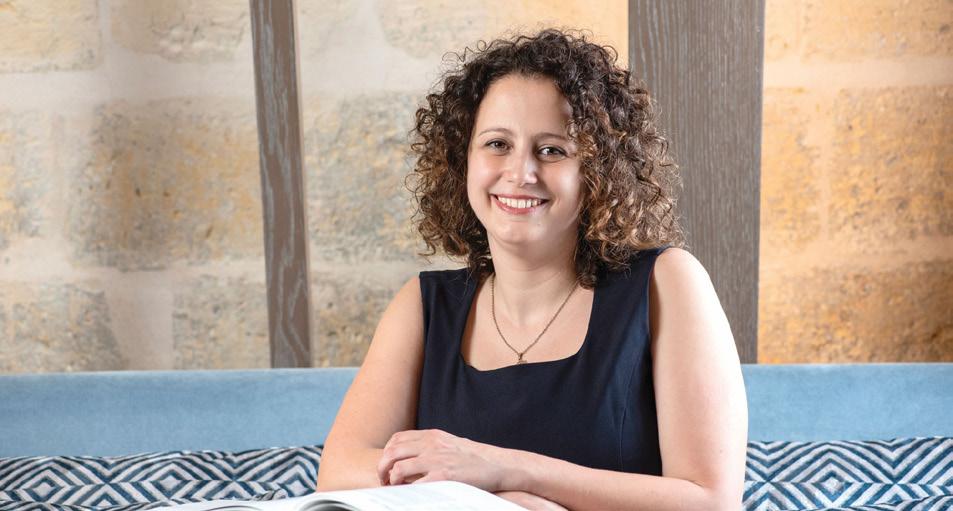
the immense changes that our society has been experiencing, employers, rightly so, are increasingly dedicating more attention by implementing initiatives to address this,” added Ms Bondin.
“As employees too are raising their expectations, a culture change needs to be triggered where all stakeholders come together to work and collaborate in a more compassionate manner,” she concluded.

“Our work at McDonald’s has become more challenging, especially after the pandemic so as a company that wants to remain true to its values, we are fully committed to providing support, safety and wellbeing to all our employees,” says Consuela Barbara, Director of HR at McDonald’s.
“To better safeguard our employees’ wellbeing, we decided to offer our employees a more flexible roster, we are giving extra leave days which they are using to carry voluntary work and we have introduced more team activities. Our HR department also operates an open-door policy, and all employees are encouraged to reach out to us if they encounter any difficulty in their life so that we try and support them as much as possible.”
One specific initiative at McDonald’s is the Emergency Support Scheme to support employees in case of a personal crisis or emergency, either financial or as special leave to cope with travel expenses for health reasons or to visit a sick relative.
“We are also conducting training on anxiety issues, on how to handle customers with autism in view of our first restaurant offering quiet space for persons with autism, training in safety, anti-harassment, and antidiscrimination and pushing initiatives in favour of women empowerment, diversity,
We are also conducting training on anxiety issues, on how to handle customers with autism in view of our first restaurant offering quiet space for persons with autism, training in safety, anti-harassment, and antidiscrimination and pushing initiatives in favour of women empowerment, diversity, inclusion, and equality.
We also supported our employees to attend a number of information sessions as part of a mental health campaign organized by Aġenzija Żgħażagħ
inclusion, and equality. We also supported our employees to attend a number of information sessions as part of a mental health campaign organized by Aġenzija Żagħżagħ,” added Ms Barbara.
“Over the coming months, we are planning more training to continue to raise awareness on mental health and will keep encouraging our people to participate in collective events such as fun runs and occasional awareness campaigns such as Pink October and Movember.”


Misco publishes 3rd Edition of Employee Wellbeing at the Workplace Survey
The issue of mental health at the workplace turns out to be greater than one would imagine according to the third edition of the Employee Wellbeing at the Workplace Survey just published by misco. “More companies are putting this subject higher on their agenda, but employees too have raised their expectations. We need a culture change where all stakeholders need to collaborate in a more emphatic and compassionate manner,” states JOANNE BONDIN, Director at misco.
misco’s first edition of its Employee Wellbeing at the Workplace Survey was published in 2020, purposely to study employee wellbeing at work on the onset of the coronavirus, followed by a second survey in 2021 to allow for comparisons.
“One of the aspects that struck us the most was that whilst stress levels remained very much at the levels of previous years with 47% claiming that their stress level is poor to very poor, 39% also stated that their sense of optimism level is poor to very poor which is slightly more than the 34% reported the previous year.”
“This can be easily attributed to the ‘pandemic fatigue’ which WHO defines as an ‘expected and natural response to a prolonged public health crisis’.”
“In 2022, many employees started working the majority of their time from the office and this post-pandemic re-entry has brought about a great deal of changes to our working style. Whilst expectations and anxieties might have changed due to the pandemic, employers and employees both need to dedicate time and effort to readapt in a sustainable manner.”
“One of the things we sought to understand through this study conducted through fieldwork in the first quarter of this year and featuring 355 respondents, was how employers are perceived to be dealing with the mental health and wellness of their employees and whether they have
Whilst in 2020, 50% agreed that that their employer takes the mental health and wellbeing of their employees seriously, this increased to 53% in 2021 and to 56% in 2022. But whereas in 2020, 41% felt their organisation encourages employees to talk openly about mental health problems, a figure that increased to 47% in 2021, this has now gone down to 38% in 2022.”
implemented any initiatives to improve the mental well-being of their employees at work. In this regard, 92% of respondents felt that it is the employer’s role to do something about the mental well-being of the employees.’
“Whilst in 2020, 50% agreed that that their employer takes the mental health and wellbeing of their employees seriously, this increased to 53% in 2021 and to 56% in 2022. But whereas in 2020, 41% felt their organisation encourages employees to talk openly about mental health problems, a figure that increased to 47% in 2021, this has now gone down to 38% in 2022.”
When asked about how they feel at work, 75% of respondents claimed that their energy level is good to very good whilst 25% said that it is poor to very poor. This means a dip from the 81% of positive responses registered in 2021.
“Mental health in the workplace has become a pressing issue and the pandemic continued to highlight the importance of having an environment that is conducive of positive mental health in the workplace. This most recent survey allowed us to continue to build on our findings to be able to provide employers with an understanding of the employees’ perspective on their well-being at work,” added Joanne Bondin.
Besides an increase from last year’s 63% to this year’s 79% of employees who experienced stress and anxiety related to work, even fewer respondents (63%) rated their mental wellness positively compared to last year (69%).
“If we take into consideration that 68% of respondents also stated that their job has caused them mental health problems over the past 12 months, this too should put additional onus on employers to take the appropriate initiatives to ensure their employee’s wellbeing.”
Interestingly, the study asked respondents to indicate which negative emotions they felt in the last 12 months. 43% experienced excessive fear, worry or anxiety, 38% experienced extreme high or low moods and 38% experienced long lasting sadness or irritability.
Asked how stressful their job is, 13% replied that their job is constantly stressful whilst 58% of respondents answered that their job is often stressful. 28% rarely find their job stressful and 1% stated that they never find it stressful. These figures represent an increase when compared to 2021 with most of them citing low morale at the workplace, lack of support, tight deadlines, and long hours as the main reasons.
The research also showed that pressure (50%), heavy workload (43%) and tight deadlines (41%) are often experienced at work. Interestingly, whereas in 2021 job insecurity was marked as a stressor by 9% of respondents, this decreased to 3% this year.
Undeniably supporting mental wellness in 2022 has been more demanding for employers than in previous years. Both organisations and employees have gone through a considerable number of changes in the recent years, and this, has revolutionised expectations and also behaviour at work.
Remote working and flexibility in work time has increased in popularity and these have undeniably put pressure on work-life balance initiatives that may have been appropriate in the past but need to be reconsidered due to the new ways of working. Moreover, employees have reacted differently to these new realities. Everyone had to find a way of working whilst keeping up relationships at work and remaining productive.
Mental health issues are dictating a big part of the agenda at the workplace and with the immense changes that our society has been experiencing, employers, rightly so, are increasingly dedicating more attention by implementing initiatives to address this. As employees too are raising their expectations, a culture change needs to happen where all stakeholders come together to work and collaborate in a more compassionate manner,”
Respondents were asked what initiatives they are offered at work, and the majority of them (47%) mentioned that their organisation offers work life balance initiatives such as flexible hours, followed by an employee assistance programme/therapy (23%) and 22% mentioned that they have an open communication culture at their workplace.
But whilst many companies consider wellbeing measures to boost productivity, a third of respondents stated that their workplace does not offer any of the mentioned initiatives in order to improve the mental well-being of the employees.
“Mental health issues are dictating a big part of the agenda at the workplace and with the immense changes that our society has been experiencing, employers, rightly so, are increasingly dedicating more attention by implementing initiatives to address this. As employees too are raising their expectations, a culture change needs to happen where all stakeholders come together to work and collaborate in a more compassionate manner,” concluded Joanne Bondin.
To acquire a full copy of the Employee Wellbeing At The Workplace survey, or to conduct a survey on the topic one may contact misco on businessreports@miscomalta.com
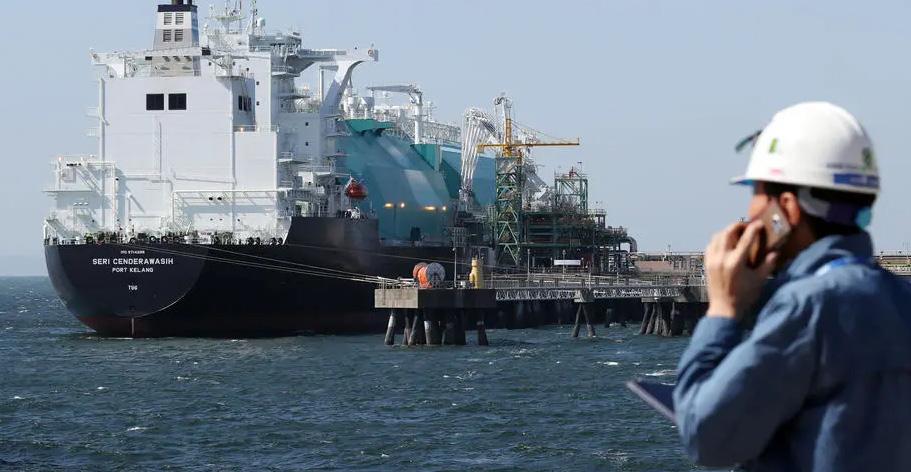
The staggering increase in the cost of living has been the economic talking point of the past weeks in Malta. While food prices continue to hit families hard, Government has sought to cushion energy prices, increasing its subsidies and putting further pressure on the country’s fiscal position.
Notwithstanding the economic turbulence generated by the war on our continent and the indirect effect of the heavy sanctions imposed on Russia, the Maltese economy continued to enjoy a healthy growth rate. GDP growth is forecasted by the European Commission to reach 4.9% this year, which is higher than that projected in spring.
Despite the undeniable effects of the war in Ukraine, strong domestic consumption and net exports continue to push the economy forward. The export of tourism services is on course to a very rapid rebound in 2022 with full recovery expected by 2023, contributing to growth in both years. In 2023, real GDP is forecast to increase at a slower pace, but still by a robust 3.8%, affected by a general economic slowdown of its main trading partners, but partially compensated by the continued growth of tourism and other services exports.
In June 2022, Malta was removed by the Financial Action Task Force from the list of jurisdictions under increased monitoring (grey-listing). This positive outcome is expected to reduce the uncertainty associated with investment.
This decision is likely to have also contributed Malta to maintaining its A- rating with a stable outlook provided by the Fitch rating agency, despite the surrounding challenges. In a report published in September, the agency acknowledged that adverse effects from the geo-political situation in our continent are inevitable but argued that the slowdown was unlikely to hurt the economy due to the injection of a significant amount of EU funds and fiscal prudence.
Estimates released by the NSO indicate that the Gross Domestic Product (GDP) for the second quarter of 2022 amounted to €4,100.4 million, registering an increase of €526.6 million, or 14.7%, when compared to the same quarter of 2021. In volume terms, GDP rose by 8.9%.
A strong surge in services was behind a strong rebound in economic activity, contributing to 8.8%. On the other hand, the improvement in the industry was marginal, with a 0.4% growth. Focusing on the services sector, the major contributors were accommodation and food services activities, ICT, transport and retail trade. Tourism certainly played its part over Summer with a t total of 712,122 passengers travelling through Malta International Airport in August, marking a recovery of 86.5 per cent of pre-pandemic traffic. The seat load factor (SLF), measuring the occupancy of the seats available on flights operated to and from Malta, reached an alltime high of 90.4%, translating to an increase of 2.4 % compared to August 2019.
In June, the volume of retail trade – which the Central Bank of Malta describes as a short-term indicator of final domestic demand – increased by 8.2% in yearon-year terms, after rising by 9.3% in May.
During the first seven months of the year, the total trade in goods deficit widened by €995 million when compared to the corresponding period of 2021, reaching €2,829.9 million. Imports and exports increased by €1,310.2 million and €315.2 million, respectively, amounting to €5,129.4 million and €2,299.5 million.
Despite the supply-side challenges which had already been impacting international markets, inflation in 2021 increased only moderately by 0.7% as energy prices were kept unchanged by state interventions and hedging contracts for gas supply. While the authorities have committed to continue limiting energy price growth in 2022, the strong increase in inflation in the first two quarters of 2022 indicates that rising international energy and commodity prices are affecting Malta’s prices indirectly.
Inflation this year is set to rise to 5.6%. The increases in food, transport and imported goods prices, and a continued recovery in the tourism and hospitality services are set to drive up price pressures also in 2023, with inflation remaining elevated at 3.3%. This is despite the continued flow of government subsidies, which are costing the public offers close to half a million euros.
In July 2022, the annual rate of inflation as measured by the HICP was 6.8%, up from 6.1%. The 12-month moving average rate for July stood at 3.7 %. The largest upward impact on annual inflation was measured in the Food and non-alcoholic beverages Index (+2%).
Despite the strong economic performance, large pockets continue to struggle. In 2021, respondents to an NSO standard-of-living survey who said that their household was in arrears on mortgage or rent payments, utility bills, hire purchase instalments or other loan payments, and respondents who said that they found it difficult to keep the home adequately warm in winter, had the highest increase when compared to the previous year. At 20.3%, the at-risk-of-poverty or social exclusion rate (AROPE) increased by 0.4% when compared to that derived from the 2020 survey. The AROPE reveals the share of persons who are either at risk of poverty, severely materially deprived or residing in a household with low work intensity.
Despite the inflationary challenges, the employment market remains a strong one with many employers and industrial sectors lamenting the difficulties in finding and keeping talent. In July 2022, the number of persons registering for work stood at 925 decreasing by 617 when compared to the corresponding month in 2021. Data provided by Jobsplus for July 2022 indicate a year-on-year decrease of 580 persons registering under Part I, and an additional drop of 37 persons registering under Part II of the unemployment register. The largest share of males and females on the unemployment register sought occupations as clerical support workers. The seasonally-adjusted unemployment rate stood at 3.0% in June 2022, marginally lower than a month earlier, and below the rate of 3.5% registered in June 2021. The rate observed in June 2022 was also the lowest rate ever recorded.
By the end of July 2022, the Government’s Consolidated Fund reported a deficit of €514.9 million. In parallel, debt levels have gone up to €8.5 billion, an increase of €709.4 million from 2021.
The increased deficit resulted from an increased discrepancy between revenue and expenditure. In
the first seven months of 2022, Recurrent Revenue amounted to €3,014.5 million, 14.7 per cent higher than the €2,627.7 million reported a year earlier. The largest increase was recorded under Value Added Tax (€130.4 million), followed by Income Tax (€120.4 million) and Social Security (€74.2 million).
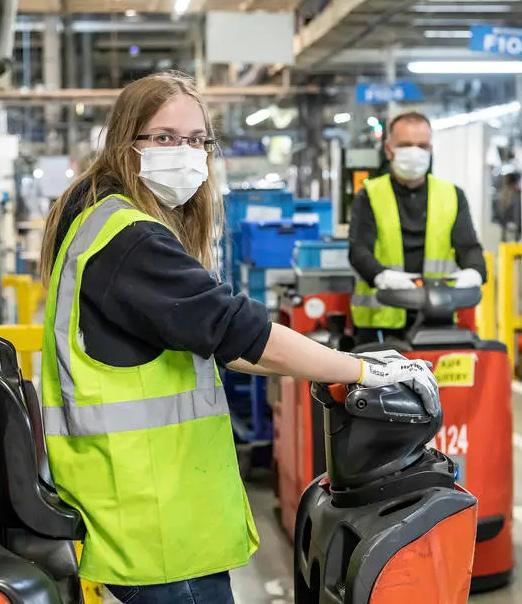
Total expenditure stood at €3,529.3 million, 0.6 per cent higher than the previous year. During the reference period, Recurrent Expenditure totalled €3,113.1 million, an increase of €36.5 million in comparison to the €3,076.6 million reported in the first seven months of 2021. The main contributor to this increase was a €41.9 million increase reported under Programmes and Initiatives.
At the end of July 2022, Central Government debt stood at €8,557.8 million, an increase of €709.4 million from 2021. The increase reported under Malta Government Stocks (€569.0 million) was the main contributor to the rise in debt. Government ministries and entities have reportedly been ordered to save about €200 million by cutting down on administrative costs.
Looking ahead: Be wary of second-round effects According to the Fitch credit rating agency, the economy will still grow by around 4% this year, with the agency noting that the economy may struggle next year due to the second-round effects of the war and the waning of the post-pandemic effect. Fitch is forecasting Malta’s GDP growth to drop to 2.7% next year, which is still significantly higher than the 1.9% predicted for the wider European Union.
These forecasts take a more conservative stance than those of the Central Bank of Malta, which in June anticipated GDP to grow by 5.4% in 2022, 4.9% in 2023 and 3.8% in 2024. These projections anticipate that more persistent supply bottlenecks as well as higher input and transport costs could adversely affect manufacturing output, private consumption, and investment. The Bank also noted the risks of a a larger deficit in 2022 and 2023. These mostly reflect the likelihood of additional Government support to mitigate rising commodity prices and State aid to Air Malta.

2022 was supposed to be the year of the great recovery after two years of social restrictions resulting from a pandemic which brought economies to a halt. As the long-drawn war in Ukraine approaches the colder months, the economic implications of the war and the sanctions on Russia for the global economy have turned gloomier. The shocks unleashed by the war are hitting the EU economy both directly and indirectly, setting it on a path of lower growth and higher inflation. Families and businesses around the globe are pushing global inflationary pressures, eroding the purchasing power of households and pushing central banks to increase interest rates. All this has greatly increased the probability of slow economic growth coupled with inflation: the much dreaded stagflation.
According to the European Commission’s latest forecast, real GDP is forecast to grow by 2.7% in 2022 and 1.5% in 2023 in the EU and by 2.6% in 2022 and 1.4% in 2023 in the euro area. The positive figure however should be considered in the context of the momentum gathered with the recovery of last year and a stronger first quarter than previously estimated. Both bring acquired growth in the first quarter of this year to a solid 2.7% for the EU and 2.4% for the euro area. Economic activity weakened in the second quarter but seemed to regain some traction during summer, thanks to a promising tourism season. In 2023, economic growth is expected to gather some momentum, on the back of a resilient labour market, moderating inflation, support from the massive inflow of funds originating from the Recovery and Resilience
Facility and a still large amount of excess savings. However, on an annual basis, there is a downward revision of almost one percentage point compared to the Spring Forecast.
At the same time, survey indicators, such as the EU-wide Purchasing Managers’ Index, point to a contraction in both the manufacturing and services sectors throughout Summer. According to the European Central Bank, the negative shock to real disposable income owing to rising prices is also expected to weigh on activity. Uncertainty, in particular related to gas supply disruptions, together with sharp increases in bank lending rates, is also constraining economic activity.
In August 2022, the Economic Sentiment Indicator (ESI) decreased further in both the EU (-1.0 point to 96.5) and the euro area (-1.3 points to 97.6). In the EU, the ESI’s decrease in August was driven by a significant weakening of confidence in the industry and, to a lesser extent, services, which was only partially offset by tentative signs of stabilisation of retail trade, construction and consumer confidence. Amongst the largest EU economies, the ESI collapsed in the Netherlands (-4.8) and posted significant declines in Germany (-2.5), France and Poland (both -1.8), as well as Italy (-1.2).
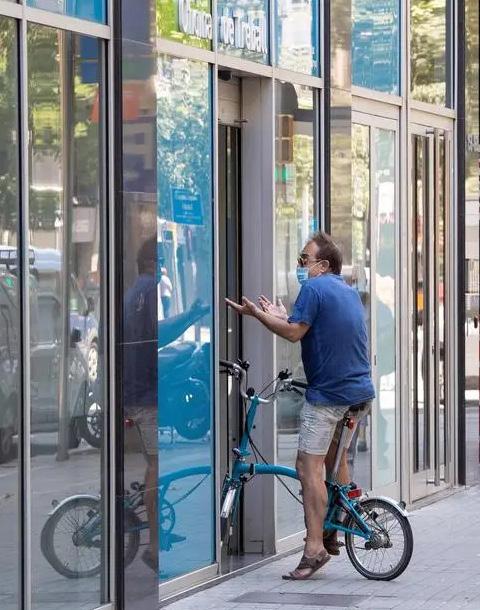
On the other hand, according to an EU-wide Business and consumer survey, consumer confidence showed signs of stabilisation (+1.0) after ten months of declining readings. After sinking to new all-time lows in July, households’ assessments of their past financial situation stayed virtually unchanged and the outlook on their future financial situation even improved. Consumers’ expectations about the general economic situation edged up and their intentions to make major purchases stayed practically unaltered. Retail trade confidence remained broadly flat (+0.3).
In the euro area in June 2022, compared with June 2021, the volume of retail trade decreased by 4.8% for non-food products and by 3.1% for food, drinks and tobacco, while it grew by 2.0% for automotive fuels. In the EU, the retail trade volume decreased by 3.9% for non-food products and by 2.3% for food, drinks and tobacco, while it grew by 2.7% for automotive fuels. Among Member States for which data is available, the largest yearly decreases in the total retail trade volume were registered in Denmark (-9.5%), Germany and Ireland (both -8.8%) and the Netherlands (-6.1%). The highest increases were observed in Slovenia (+22.1%), Poland (+9.3%) and Cyprus (+8.4%).
Despite international turbulence, the employment market remains relatively strong. In July 2022, the euro area seasonally-adjusted unemployment rate was 6.6%, down from 6.7% in June 2022 and from 7.7% in July 2021. The EU unemployment rate was 6.0% in July 2022, down from 6.1% in June 2022 and from 6.9% in July 2021.
Eurostat estimates that 12.959 million men and women in the EU, of whom 10.983 million in the euro area, were unemployed in July 2022. Compared with June 2022, the number of persons unemployed decreased by 113,000 in the EU and by 77,000 in the euro area. Compared with July 2021, unemployment decreased by 1.8 million in the EU and by 1.58 million in the euro area.
In July 2022, 2.63 million young persons (under 25) were unemployed in the EU, of whom 2.17 million were in the euro area. In July 2022, the youth unemployment rate was 14.0% in the EU
and 14.2% in the euro area, down from 14.2% and 14.4% respectively. Compared with June 2022, youth unemployment decreased by 55,000 in the EU and by 35,000 in the euro area. Compared with July 2021, youth unemployment decreased by 329,000 in the EU and by 244,000 in the euro area.
Families and businesses across the continent are struggling with record price increases. Euro area annual inflation reached 9.1% in August 2022, up from 8.9% in July. Expectedly, energy had the biggest contribution to this (38.3%, compared with 39.6% in July), followed by food, alcohol & tobacco (10.6%, compared with 9.8% in July), non-energy industrial goods (5.0%, compared with 4.5% in July) and services (3.8%, compared with 3.7% in July).
For the last month for which data is available on a country-by-country basis (July), the lowest annual rates were registered in France, Malta (both 6.8%) and Finland (8.0%). The highest annual rates were recorded in Estonia (23.2%), Latvia (21.3%) and Lithuania (20.9%). Compared with June, annual inflation fell in six Member States, remained stable in three and rose in eighteen.
Inflation in the EU is expected to average to 8.3% in 2022 (7.6% in the euro area), and to 4.6% in 2023 (4.3% in the euro area).
The prevailing situation is also impacting Member States’ budgets. The euro area budget balance is projected to improve steadily in the period to 2024, but by less than foreseen in the June 2022 projections. At the end of the first quarter of 2022, the government debt to GDP ratio in the euro area stood at 95.6%, compared with 95.7% at the end of the fourth quarter of 2021. In the EU, the ratio also decreased from 88.1% to 87.8%
The highest ratios of government debt to GDP at the end of the first quarter of 2022 were recorded in Greece (189.3%), Italy (152.6%), Portugal (127.0%), Spain (117.7%), France (114.4%), Belgium (107.9%) and Cyprus (104.9%), and the lowest in Estonia (17.6%), Luxembourg (22.3%) and Bulgaria (22.9%). Future hard to predict The uncertainty surrounding the developments in Ukraine makes
New increases in gas prices could further driveup inflation and stifle growth. Indeed, discussions in Brussels on the issue were complex and longdrawn. The European Commission has pushed a package of proposed emergency measures this week including a windfall profit levy on energy firms, but countries are split over the details and whether to impose a cap on gas prices.
forecasting harder. In its Summer assessment, the European Commission acknowledges that risks to the forecast for economic activity and inflation are heavily dependent on the evolution of the war and in particular its implications for gas supply to Europe.
The possibility that the resurging pandemic in the EU brings renewed disruptions to the economy cannot be excluded. According to the European Central Bank, high inflation will imply a contraction in real disposable income in both 2022 and 2023, despite the continued resilience of the labour market and associated labour income. While the labour market is projected to weaken in the wake of the expected slowdown in economic activity, it is seen to remain resilient overall.
New increases in gas prices could further drive-up inflation and stifle growth. Indeed, discussions in Brussels on the issue were complex and long-drawn. The European Commission has pushed a package of proposed emergency measures this week including a windfall profit levy on energy firms, but countries are split over the details and whether to impose a cap on gas prices.
Second round effects could in turn amplify inflationary forces and lead to a sharper tightening of financial conditions that would not only weigh on growth but also come with increased risks for financial stability. Despite all this, the EU economy is set to continue expanding, but at a significantly slower pace than expected earlier this year.
Key sources: Eurostat data
European Commission Spring & Autumn Economic Forecasts European Central Bank Macroeconomic projections September 2022

The world in a few weeks lost two icons of recent history...the death of Queen Elizabeth and that of the last Soviet leader with the passing away of Mikhail Gorbachev.

Two leaders that defined their time and a somewhat extinct breed of leaders in a world now where financial success and celebrity now reign.
A 70-year reign is more than the lifetime of most people.
Elizabeth Alexandra Mary came to the throne at a tipping point in British history. As her reign progressed, the old orderChurch and aristocracy, the gradations of class and knowing your place - crumbled. She was described as politically neutral, and diplomatically useful.
It was this avoidance of any political controversy as head of state, and her refusal to bend the monarchy to the winds of fashion, that enabled her to triumph in the role that would earn her the love and respect of so many, as head of the nation.
Some commentators describe her reign as a “golden age” reminiscent of that of her namesake Elizabeth I, who ruled England 400 years ago during a period of growing power and cultural flourishing.
Others argue she leaves no tangible mark, only an institution unfit for purpose in a world of egalitarian aspirations, irreverent social media commentary and scrutiny by roundthe-clock media outlets.
Yet it is hard to deny that no matter what the critics say, her legacy is still remarkable: ensuring the monarchy survived an era of rapid change. While the nation she reigned over sometimes struggled to find its place in a new world order and her own family often
Others argue she leaves no tangible mark, only an institution unfit for purpose in a world of egalitarian aspirations, irreverent social media commentary and scrutiny by round-the-clock media outlets.
fell foul of public expectations, the queen herself remained a symbol of stability.
During her reign presidents, popes and prime ministers have come and gone, the Soviet Union collapsed, and Britain’s empire has gone, replaced by a Commonwealth of 56 nations which Elizabeth was instrumental in creating. As head of state, she had 15 British prime ministers, the last Liz Truss, who she only appointed a day before her death, was her 15th.
During the Cold War, however, her meetings with leaders from the Soviet bloc were few and far between.
In 1956, Elizabeth received Soviet leader Nikita Khrushchev, who was overseeing a political thaw after replacing Joseph Stalin. But it would be more than three decades later, in 1989, that Mikhail Gorbachev would be invited for an audience. It came after he launched a policy of “perestroika” (restructuring) which led to the collapse of the Soviet Union.
The queen was the first British monarch in history to visit Russia when she was hosted by President Boris Yeltsin in 1994.
Like the Queen, Mikhail Sergeyevich Gorbachev left a lasting impression on world history, the Russian words “glasnost” and “perestroika” became common words in the English language, the Cold War ended, and the Soviet Union crumbled. Loved abroad not so much at home.
Many were the word of praise outside Russia, less so from within the former Soviet Union. Similar judgements on past leaders are difficult, complicated, and always controversial.
Russian President Vladimir Putin missed the funeral of the last Soviet leader, denying the man who failed to prevent the collapse of the
Soviet empire the full state honours granted to Boris Yeltsin.
Gorbachev, idolised in the West for allowing eastern Europe to escape Soviet communist control but unloved at home for the chaos that his “perestroika” reforms unleashed, was buried after a public ceremony in Moscow’s Hall of Columns.
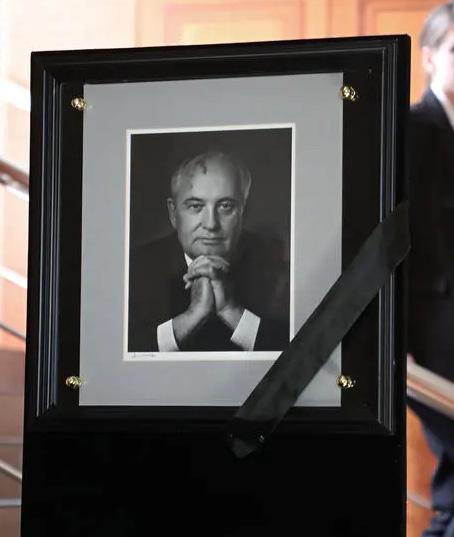
It was a marked contrast to the funeral of Yeltsin, who was instrumental in side-lining Gorbachev as the Soviet Union fell apart and hand-picked Putin, a career KGB intelligence officer, as the man most suited to succeed him.
When Yeltsin died in 2007, Putin declared a national day of mourning and, alongside world leaders, attended a grand state funeral in Moscow’s Cathedral of Christ the Saviour. Russia’s intervention in Ukraine appears aimed at reversing at least in part the collapse of the Soviet Union that Gorbachev failed to prevent in 1991.
Gorbachev’s decision to let the countries of the post-war Soviet communist bloc go their own way, and East and West Germany reunify, helped to trigger nationalist movements within the 15 Soviet republics that he was powerless to quell.
Five years after taking power in 2000, Putin called the breakup of the Soviet Union “the greatest geopolitical catastrophe of the 20th century”.
It took Putin more than 15 hours after Gorbachev’s death to publish a restrained message of condolence that said Gorbachev had had a “huge impact on the course of world history” and “deeply understood that reforms were necessary” to tackle the problems of the Soviet Union in the 1980s.
Gorbachev promoted transparency by opening the Soviet archives so that Russians
could see for themselves how many millions of their own people Stalin and Lenin had killed for no reason. Putin did the opposite: Closing the archives, censoring history books, reintroducing the state’s dogma of infallibility, and resorting to lies to promote the patriotic education of the masses.
During his time, Gorbachev withdrew troops from the unwinnable Afghanistan war. Putin, on the other hand, has dispatched forces in a “special military operation” to fight nonexistent fascism in Ukraine.
Gorbachev secured a place in the history books. No other politician changed the world for the better in the second half of the 20th century as he did. Millions of people across the world started learning the Russian language because of Gorbachev, this new, humane politician.
Gorbachev like everyone in life had his successes and failures, some remember either one or the other, but his main political aim was always to strive for a better world.

The story of a Ukrainian chaplain who spent 70 days in Russian captivity Article by Inna Honcharuk-Plikhivska
“This is a horde. They want to torture. The whole world should know this! Everyone should know that these are non-humans. They have already broken all the laws, all the rules –international, moral and Christian. They have been destroying us for more than 300 years, starting with Emperor Peter and Empress Catherine, who banned the Ukrainian language and literature – this is denazification. Destruction of the Zaporizhia Sich, Sich rebels, Ukrainian Insurgent Army – this is demilitarization. Then Stalin, Beria and now Putin”, –chaplain Father Vasyl cannot speak without emotion.
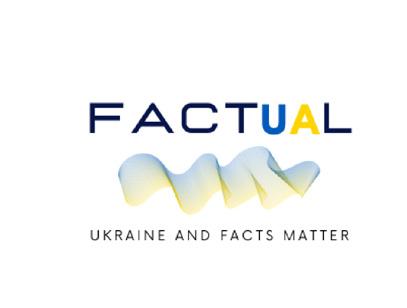
Father Vasyl Vyrozub is the abbot of the Odesa Holy Trinity Church of the Orthodox Church of Ukraine, an active initiator of the creation of chaplain service in the Armed Forces of Ukraine. For some time he was a chaplain in the places of military missions. On February 25, the second day after the Russian invasion of Ukraine, the priest was taken prisoner, where he spent more than two months. Father Vasyl told Factual about the horrors he had to go through in the hands of the enemy, how he managed to survive and not break down. After returning from captivity, the priest did not give interviews because he was afraid that his testimony would harm the exchange of prisoners. However, after the Russians burned the captured Azov heroes alive in Olenivka, he decided that there was no point in remaining silent.
On February 25, Father Vasyl, as part of a humanitarian mission, was on the search and rescue ship “Sapphir”, which was on its way from Odesa to Snake Island to evacuate the bodies of dead Ukrainian soldiers. There were 3 chaplains, a doctor and 19 crew members on board. The Russians promised a green corridor, but it turned out to be a lie.
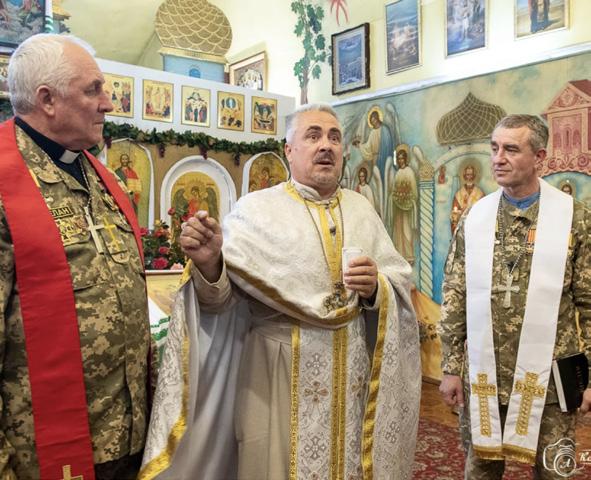
“On February 26, already near the island, the Russians ordered us to drop anchor, – Father Vasyl said. – Our soldiers were no longer there – those who survived were
taken prisoner. We waited for about three hours for the inspection group of Russians. The commandos themselves were afraid to approach our ship. When they came on board, we were all taken out on deck, put on our knees under the muzzles of machine guns, hands behind our heads. A thorough search was conducted for three hours. They thought we were some special group”. Of course, the Russians had no intention of releasing the members of the humanitarian mission. First, the prisoners were taken to the prison in Sevastopol in occupied Crimea. There, according to Father Vasyl, the prisoners were only interrogated – they were not tortured.
“Interrogated, interrogated, interrogated… it was constant, – recalls the Father. – We were interrogated by all possible services. I wouldn’t be surprised if the janitor came and asked why we were heading to Zmiiny”.
The Russians could not believe that the ship was going to the island to evacuate the bodies of dead Ukrainian soldiers: “Why do you need these bodies – the occupiers could not calm down. – Are you crazy or immortal?”
In the end, the Russians decided that the prisoners were saboteurs. “Three priests and a doctor,- Father Vasyl laughs. – They found the saboteurs! But it was time for them to explain something – they stood their ground.” At first, the attitude towards the prisoners was quite tolerant, they even promised to release them – now or… after the end of the “operation”. Father Vasyl was indignant, saying that the so-called operation could last months, or even longer. “You really don’t understand, priest, look at this power (it’s about the military cruiser “Moscow” which Ukrainian army sank later, – author) – if it fires, it will destroy not only this island (Snake island) – your Ukraine will not be there! 7-8 days – that’s it! Then I looked around, and the Russian military were all around. Will Ukraine be gone in 7-8 days?”
After Crimea, the prisoners were flown to Russia in the Belgorod region – first to a filtration camp. Even here, hell awaited the prisoners: in addition to constant interrogations, they were brutally beaten and subjected to various tortures.
“It’s -22 degrees outside, and we are lined up in the cold. Some were in torn clothes or in one boot. They put everyone on their knees, just on the snow, with the hands behind heads, they harassed dogs at us and shined lanterns in our faces. And again – the same interrogations: what was I doing near Snake island, which special service do I work for”…
The executioners did not even want to hear that the crew was performing a humanitarian mission. All prisoners were assigned numbers instead of names and surnames. “Your number is 27, – recalls Father Vasyl of his new “name”. – Now you don’t have a surname and there is no God here. There is no doubt that they do not have God. That’s all, but they are perfectly capable of torturing, humiliating, breaking dignity, honour, robbing, destroying, killing, raping. They cannot live in peace and friendship, build something, create. Irpin, Bucha, Borodyanka, Mariupol, now Izyum, the destruction of the Azov heroes. The fact that they mocked them, tortured them and then killed them is clear. Because if we, civilians were beaten, only because we simply had to be beaten. In front of my eyes, a Russian soldier hit my colleague – the chaplain, in the face with a heavy boot, he asked – for what?
In response, he heard: “If it was for anything, I would kill you, hohol!” And they simply hated the Azov heroes. The fact that they burned them in order to hide their crime is true».
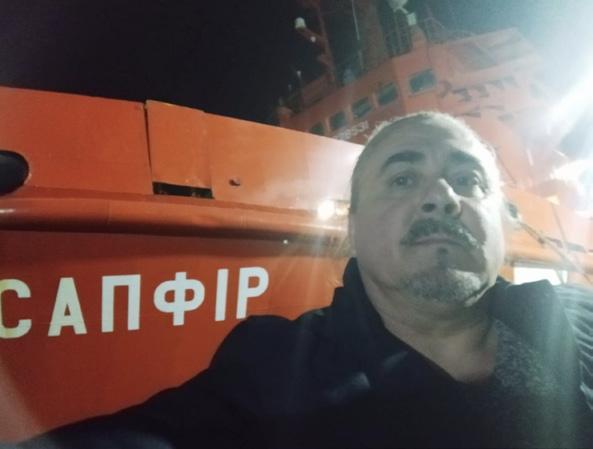
During one of the interrogations, a Russian military officer said to Father Vasyl, that the Ukrainians were zombified, and he said that Ukrainian civilians burned a tank with three Russian soldiers. “I asked – where, in Russia? – No, in Mariupol (Ukraine, – author). It does not occur to them that Ukrainians are fighting for their land, for their freedom. They
thought that it would be Crimea No. 2: they would march in a parade, receive medals, money, and that was it. But, when our Azov heroes beat the Russian army near Mariupol and the Ukrainian army pushed them back near Kyiv, when they started getting killed and wounded, their attitude towards us prisoners also changed radically. They started biting us with dogs, throwing us in solitary confinement, beating us with rubber batons, electric shockers, broke our hands, stretched us on twine. Atrocities!”
The captives were isolated from any information, but they understood: the worse their treatment, the more victories Ukrainian soldiers have on the front lines. The soldiers were forced to line up and ordered to sing the Russian national anthem. Father Vasyl prayed instead, for which he received a very cruel punishment: he was kept completely naked for about four days without sleep, water and food at a temperature of +7 degrees. “I have already started day dreaming. I thought it was the end”.
Nevertheless, one day Father Vasyl heard the command “Out!”. “I didn’t know where I was being taken – whether I would be thrown into a solitary confinement cell again, or

transported somewhere else again. I was completely in their power, and this power has no rules, no principles, no morals.”
The captives were prepared for the worst. Fortunately, an exchange of prisoners took place and Father Vasyl returned to his native Odesa on the 6th of May.
I couldn’t resist and asked the priest how he managed to survive all this pressure –physical and psychological – and not break down in the captivity of the Russians.
“It is probably more difficult to keep yourself mentally active than physically. When we were taken to the filtration camp, it was very scary, they beat us with rubber batons. I confess, I thought I would not return alive from there. 20-22 people were thrown into one tent. And when you see a young soldier, 23-24 years old, like a young wolf, hunched over, looking at a Russian soldier, and there is not an iota of fear in his eyes. And this is not hatred – it is bitterness that the young wolf was hidden in a cage. When you see the courage in the eyes of this child, you, as a chaplain who has lived for more than 50 years, have no right to be afraid. You simply have no right to be afraid. I put the cross on myself and said: “Lord, God, help!” We also came up with the command – “Get up to pray!”
In your opinion, why are the Russians doing this? Why do they need this war?, I asked. “Do you remember, in Ukrainian cities, Russian soldiers wrote on the walls: Who allowed you to live so well? This is the main idea of this war. They are up to their necks in mud and want everyone to live like that. There, in captivity, I constantly had such a déjà vu that I ended up in the Soviet Union: the same jokes, anecdotes, problems, even the same oily green paint on the walls. And these “liberators” want to return us, free people, to that hopeless slavery.
Therefore, I am asking God, the Ukrainian army and the whole world – do not let this
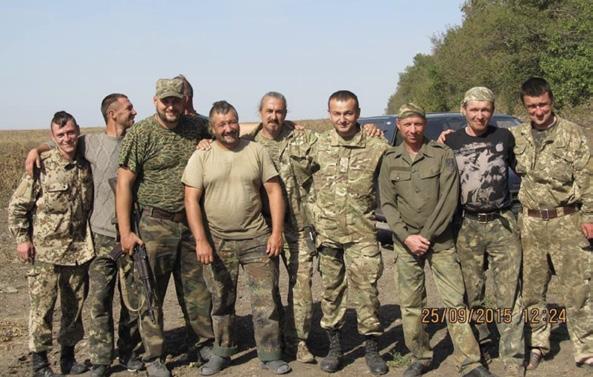
horde come here, because they will destroy us. At the moment, Ukraine is an outpost, we have become a platform for the war of two worlds – free and totalitarianism. If Russia destroys Ukraine, then it will go to Poland and then to Europe. An animal’s appetite wakes up while eating. And I think Europe understands that. And I am sincerely grateful to the European Union, which is actively helping Ukraine in this war – with weapons, funds, and the support of our citizens. Together we will definitely tame this beast – Russia.
“When I returned from captivity, honestly, I was pleasantly shocked – the whole of Ukraine had changed. I returned to the country that should have been since 1991 (August 24, 1991 – Independence Day of Ukraine, – author). I saw yellow and blue Ukraine not on the facades of houses, but in the hearts, and I saw embroidery in the hearts of Ukrainians. If we had been building such a state since the beginning of the 90s, no one would have allowed themselves to attack it. It is a pity that now we are going through such training, trials – the price for this freedom is too high.
For Ukraine, for its will, for honour, for glory!” factual.eu
 By Keith Zahra
By Keith Zahra
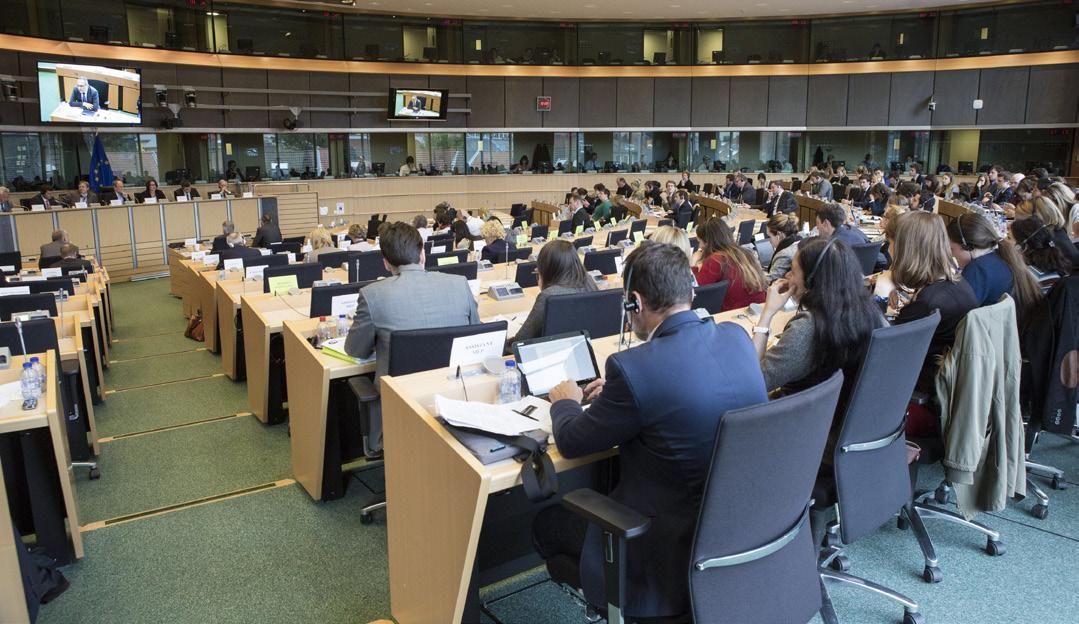
The European Commission has launched a call for proposals launched under the Connecting Europe Facility (CEF) for Transport programme which makes available over €5 billion for European transport infrastructure projects. The funding will support projects across all EU Member States along the Trans-European Transport Network (TEN-T) –the network of rail, inland waterways, ports, and roads that connects Europe. The projects will help
the EU meet its European Green Deal objective of cutting transport emissions by 90% by 2050. Projects reinforcing the Solidarity Lanes will also be eligible. Projects funded under this call will contribute to the creation of an interconnected multimodal transport system for both passengers and freight. The objective is an affordable, reliable and effective rail network, improved inland waterways navigation and infrastructure in maritime ports, a balanced interconnection between different modes of transport, and increased automation and interoperability for greater efficiency and safety along the entire transport network.
The three European financial services Supervisory Authorities (EBA, EIOPA and ESMA - ESAs) said that the deteriorating economic outlook, high inflation and rising energy prices have increased vulnerabilities across the financial sectors. In their Autumn 2022 joint risk report, the ESAs noted that financial institutions and supervisors should continue to be prepared for a deterioration in asset quality in the financial sector and monitor developments including in assets that benefitted from temporary measures related to the pandemic and those that are particularly vulnerable to a deteriorating economic environment, to inflation as well as to high energy and commodity prices. The impact of further increases in policy rates and of potential sudden increases in risk premia on financial institutions and market participants at large should be closely monitored. The report also refers to increased operational challenges associated with heightened cyber risks and the implementation of sanctions against Russia. The financial system has to date been resilient despite the increasing political and economic uncertainty.
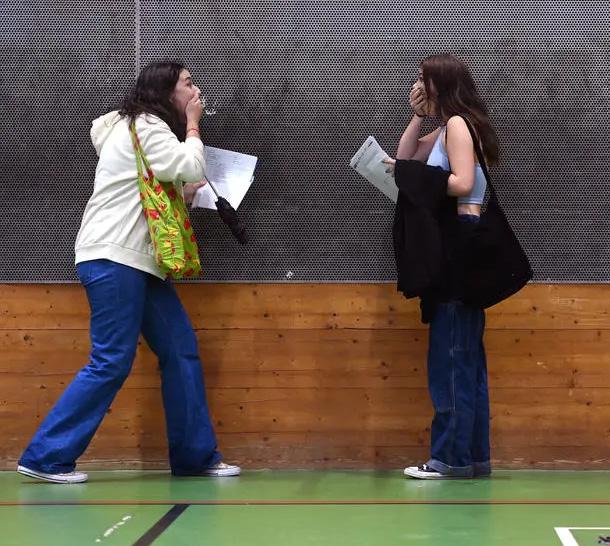
The European Commission has launched its European Care Strategy aimed at ensuring quality, affordable and accessible care services across the European Union and improving the situation for both care receivers and the people caring for them, professionally or informally. The Strategy is accompanied by two Recommendations for Member States on the revision of the Barcelona targets on early childhood education and care, and access to affordable high-quality long-term care. The Commission is proposing that Member States revise the targets on early childhood education and care to enhance women’s labour market participation, also called ‘the Barcelona Targets’, set in 2002. The current targets call on Member States to provide childcare to 33% of children under 3 and 90% of children from age 3 until mandatory school age. The Commission is proposing new ambitious yet realistic targets so that by 2030 at least 50% of children below the age of
3 are in early childhood education and care while 96% of children between the age of 3 and the starting age for compulsory primary education are in early childhood education and care, as already agreed in the European Education Area framework.
The Council has adopted a decision that fully suspends the visa facilitation agreement between the EU and Russia. Consequently, the general rules of the visa code will apply to Russian citizens. This will result in an increase in the visa application fee from €35 to €80, the need to present additional documentary evidence, increased visa processing times and more restrictive rules for the issuance of multiple-entry visas. The EURussia visa facilitation agreement entered into force on 1 June 2007. Its purpose was to facilitate the issuance of short-stay visas (no more than 90 days per 180 days) based on reciprocity. The full suspension affects all categories of travellers coming to the EU for a short stay. The Commission is expected to present additional guidelines to ensure this suspension does not negatively impact certain people travelling to the EU for essential purposes, such as journalists, dissidents and civil society representatives.



Anthony Gatt has been Director of Caritas, one of Malta’s largest community organisations, for the past four years, however, he has been involved with voluntary work for most of his life. Having worked in the addictions field for 22 years and been a counselling psychologist since 2004, he certainly needs no introduction amongst all those working, or involved with the local social services sector.

Whilst his upbringing has allowed him to “discover the joy of living from a very young age,” Anthony feels inspired by strong religious beliefs and fuelled by a deep motivation for life. Today he feels that he has managed to strike the right balance between his life as a family man, his work at Caritas and his newly found passion for endurance running.
“Ultimately, I am driven by what I feel is our scope of existence – learning how loved we are and feeling compelled to reflect this to those who cross our path.”
I am 46, grew up in the tal-Karmnu neighbourhood in Valletta and I come from a family of four siblings raised in Christian values. After my primary education at Stella Maris College in Gżira and my secondary at Tal-Handaq Junior Lyceum, I completed a first degree in psychology at the University

For the past 21 years, I have been married to Marisa, a social worker with whom we have four girls and a boy, as well as Lilly our pet dog. These last couple of years I developed a love for trail running and obstacle course races, an activity that has helped me discover the joy of physical exertion. To date, I am hooked!
As a child, I was in Legion of Mary and I remember visiting children in hospital. Witnessing their pain and trying to be of solace has had a lasting impact on me. So as I grew up, I felt more inclined toward helping and engaging with various voluntary organizations such as the Diocesan Youth Commission. Eventually helping became my job. Having worked at Sedqa, in private practice and more recently with Caritas made me realize that more than a job, mine is a vocation.
of Malta and a Master’s degree in Counselling Psychology at the University of British Columbia in Canada.Incidentally, my first paid work was a year with Caritas in 1999 after graduating from university. I was responsible for volunteers. I moved on to Sedqa where I worked until 2011. During this time, I trained as a psychologist. In 2015 I joined Caritas again as a Clinical Coordinator running the drug rehabilitation programmes and services. It felt like a homecoming. After three years in this role, I was appointed Director.
There is no typical week because the work is so varied! The biggest chunk of my time is spent supporting senior management with operational, infrastructural, administrative, fundraising, human resources, and financial issues. However, I also find it important to keep in touch with the grassroots, so I visit staff and residents in our centres; I carry out media interviews as part of Caritas’ advocacy work; I network with stakeholders within the church, other NGOs and government services. Since I started running, in weekends early morning, I join the Caritas’ running or
cycling groups that most often start from San Blas or the Prison Inmates Programme.
In the last years, the major challenge was managing the growth of Caritas as the Tal-Ibwar Adolescent Therapeutic Centre and the Caritas Community Centre was being built and new services started being developed and implemented. Covid-19 of course did not help and made it more challenging but I am deeply grateful to our staff and volunteers who soldiered on day by day with passion and dedication. Currently, the challenge is to recruit professionals in the social field because there are not enough in the field. Combating poverty and substance dependence also remains a daily challenge.
A dear Jesuit friend of mine, Fr Paul Chetcuti, describes God as the constant and infinite transaction of giving gratuitously and receiving worthily and humbly. Therefore, my belief in God’s love for me, for humankind

What are the current challenges and how do you seek to overcome them?
and all creation as well as Christ’s suffering that accompanies all humans going through their suffering is what inspires me the most. There is no greater love than giving one’s life to others and perhaps this is why I do what I do.
You recently found a new passion – endurance running. How did this happen?
As I turned 44, my work colleagues started pushing me into starting to exercise. With Covid, I started following workouts online which led me to lose 20 kgs. So then, I started running after a friend of mine David Saliba introduced me to it. Eventually, I took up trail running which I not only find magnificent but almost meditative because I am constantly running amidst nature. All thoughts and worries vanish and for a few moments, it feels like freedom. Connecting with nature becomes a very spiritual experience and I have come to know a lot of new people who share the same passion. The races and the teamwork in obstacle courses also give me an indescribable natural high. Very recently I ran my longest distance 32.5 km over 4 hours. I wish to complete a full marathon and eventually, graduate to ultra-running by going beyond the 50 km distance.
By enjoying all that I do, as challenging as it may be. I love my family, I love my work and I love my running and my motivation for life fuel me. I try not to overdo it and I try to be more available to my family. My wife is a huge anchor for me and she keeps me grounded.

After the opening of the Tal-Ibwar Adolescent Therapeutic Centre and the soon-to-be officially opened Caritas Community Centre, we will be doing some consolidation work. We have also started working on two new significant projects – a specialised housing project for women transitioning out of addiction and a partnership with the St Peter’s Foundation supporting activities related to the storage and distribution of food to people in need. We are also developing social enterprise as a tool to help integrate vulnerable persons into work while raising funds to support the delivery of free psychosocial services to those who need it most.
Favourite food: Salads
Favourite drink: Water
Favourite spot in Malta: The clay slopes between Ġnejna and Għajn Tuffieħa
Summer or Winter? Summer mostly but love to run in the rain on slippery slopes too!
A very cherished memory: The birth of my children
A disappointing moment: Whenever I let my family down
Your favourite trait about yourself: Positivity and Humour
What would you like to be most remembered for?
Loving Kindness



 By James Vella Clark
By James Vella Clark
Artist Fabio Borg (b. 1974) makes a comeback to the local art scene with his eighth solo exhibition throughout October at The Palm Court Lounge, The Phoenicia Malta. Themed “Landmarks”, the artist portrays this exhibition as a collection of abstract landscapes in an homage to trees and nature.
“All my works have been produced in the studio and not en plain air, construed and made real through the brush as innate emotions being expressed onto canvas and painted by instinct. The paintings, therefore, become emotional landmarks through which I invite viewers to partake in,” says the artist.
Borg is sensitive to his surroundings and trees, or the seeming lack thereof, is one such issue often a topic of heated discussions. Therefore, in these compositions, largely produced in the last two years, trees are the main protagonists in an idealized reinterpretation of nature.
There are no buildings in sight in this collection of paintings and nothing to detract our attention from nature, except for maybe a path that leads the viewer deeper into the composition. Landscapes are hazy, dreamy, and sometimes even eerie, but they are also hauntingly beautiful.
These paintings sometimes show bursts of colour which were executed only with a limited palette. Blues, reds, and yellows are central to this collection, with The Black
Trees being the one that is almost entirely monochrome and powerful. The palette employed is one of warm and cool tones that Borg created himself from the main primary colours, mixing them to achieve the depth of tone that we can experience at first hand.

They are not your typical pretty landscapes. The raw emotion that goes into the production of these paintings has also resulted in some of the compositions verging on the abstract, but these are a completely different nonrepresentational type of painting than what Borg himself has produced in the past.

Being of Italian descent, and having also lived in Italy, Fabio Borg often gives his paintings’ titles in the Italian language. In fact,
‘Landmarks’ comes as a natural progression from ‘Radici’, a solo exhibition Fabio Borg held in April 2022 at Galleria Vittoria, one of the prestigious galleries in Rome on via Margutta. In this collection of paintings, we see a mature artist at work and one who is sensitive to issues concerning his homeland.
‘Landmarks’ will open at The Phoenicia Malta from the 3rd until the 30th of October and is curated by Dr Charlene Vella.




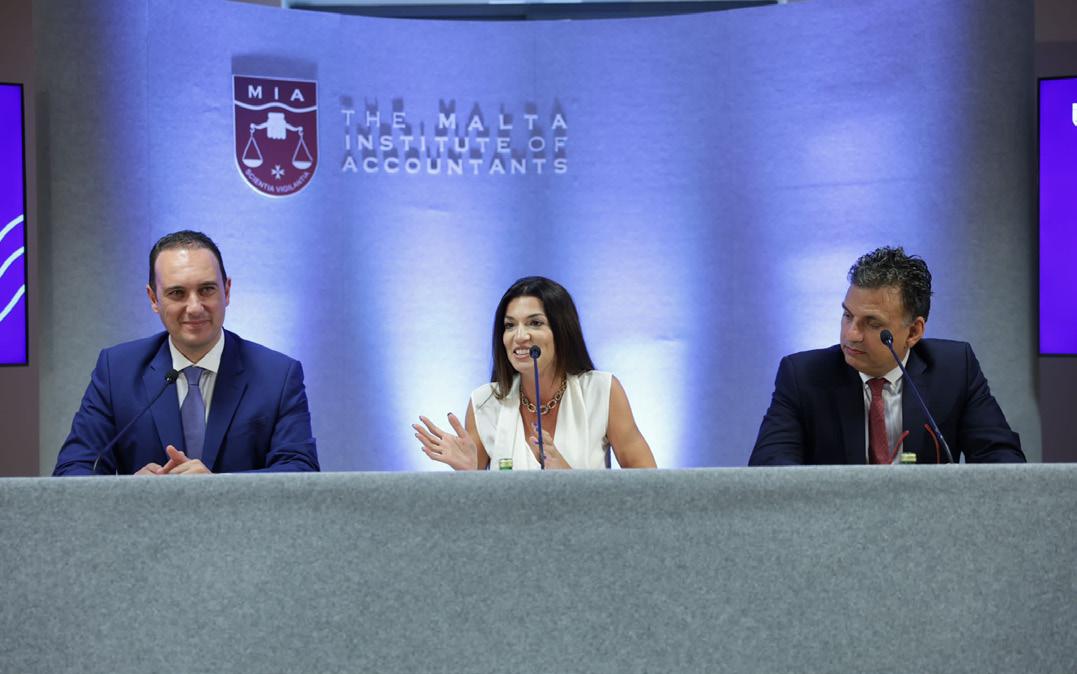
The Malta Institute of Accountants has launched the second edition of the #AccountsForYou Awareness Campaign, as it seeks to encourage young students to discover more about the exciting and varied career opportunities that this profession provides. It will also address the need for wider financial literacy starting at a young age, a key tool in the development of the citizens of tomorrow
The campaign was launched by MIA President David Delicata and CEO Maria Cauchi Delia in the presence of the Minister for Education, Sport, Youth, Research and Innovation Hon. Dr Clifton Grima.
Addressing a press briefing at the Institute’s Head Office, MIA President David Delicata noted that despite the turbulent economic times of recent years, the Maltese economy has continued to grow and attract higher-quality jobs particularly in the services-based industry, creating the need for an increasing cohort of accountancy and auditing professionals. Quoting a recent survey commissioned by the MIA, the Institute of Taxation and the Institute of Financial Services Practitioners, the ExportOriented Foreign Direct Investment services sector employs more than 28,000 persons, excluding many more thousands who provide ancillary services to such industry. While hundreds of students yearly qualify to act as accountants through University of Malta and the MIA-ACCA Joint Scheme, demand continues to outstrip supply.
“Accountancy is synonymous with a profession which highlights the importance of ethics, professionalism and good governance. It is a profession which has demonstrated resilience throughout times, and offers professionals engaged in it the opportunity to make a difference, for accountants play a key role in every organisation, irrespective of its industry or size. Our aim is to encourage young people to be aware of these opportunities,” Delicata added.
MIA CEO Maria Cauchi Delia explained that the campaign will be targeted towards students in Year 8 and Year 11 in state, church, and independent schools as well as postsecondary institutions, these being important
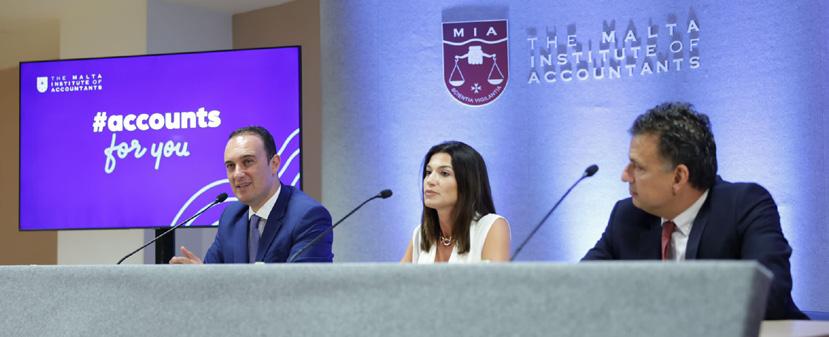
junctures on their study path. The campaign will feature live sessions in schools supported through a digital campaign on the social and media platforms which are frequently used by the younger community.
Cauchi Delia said that the first edition of the campaign, despite the limitations of the pandemic, reached more than 1,000 children from 40 schools, with the Institute targeting to sustain and possibly improve on these numbers.
Minister for Education, Sport, Youth, Research and Innovation Dr Clifton Grima said: “In a constantly evolving world, the labour market is coming up with new requirements. In this context, we need to provide guidance to our country’s students at the delicate phase of their life when they make important choices that will impact their future. For this reason, we should promote subjects that help them achieve these goals, including those related to accountancy, so that the market requirements are met.” The Minister recalled that decisions on their future career need to be ultimately taken by the children themselves, and it is for this reason that the Guidance and Counselling Unit within the Education Ministry provides guidance to students so that their choice is made according to their aspirations and abilities, while also focusing on the wider socioeconomic development.
The Malta Institute of Accountants would like to thank the Ministry of Education, the Department of Accounts within the Directorate for Learning and Assessment Programmes (DLAP) which is supporting this campaign, as well as MIA officials, members and staff, together with other contributors and sponsors for their contribution and support towards this campaign.
Consumers will continue to pay rising prices for goods if the costs connected with logistics keep going up, the CEO of a leading logistics company in Malta has warned, amid fears the authorities might not be “sensitive” to the ongoing issues.
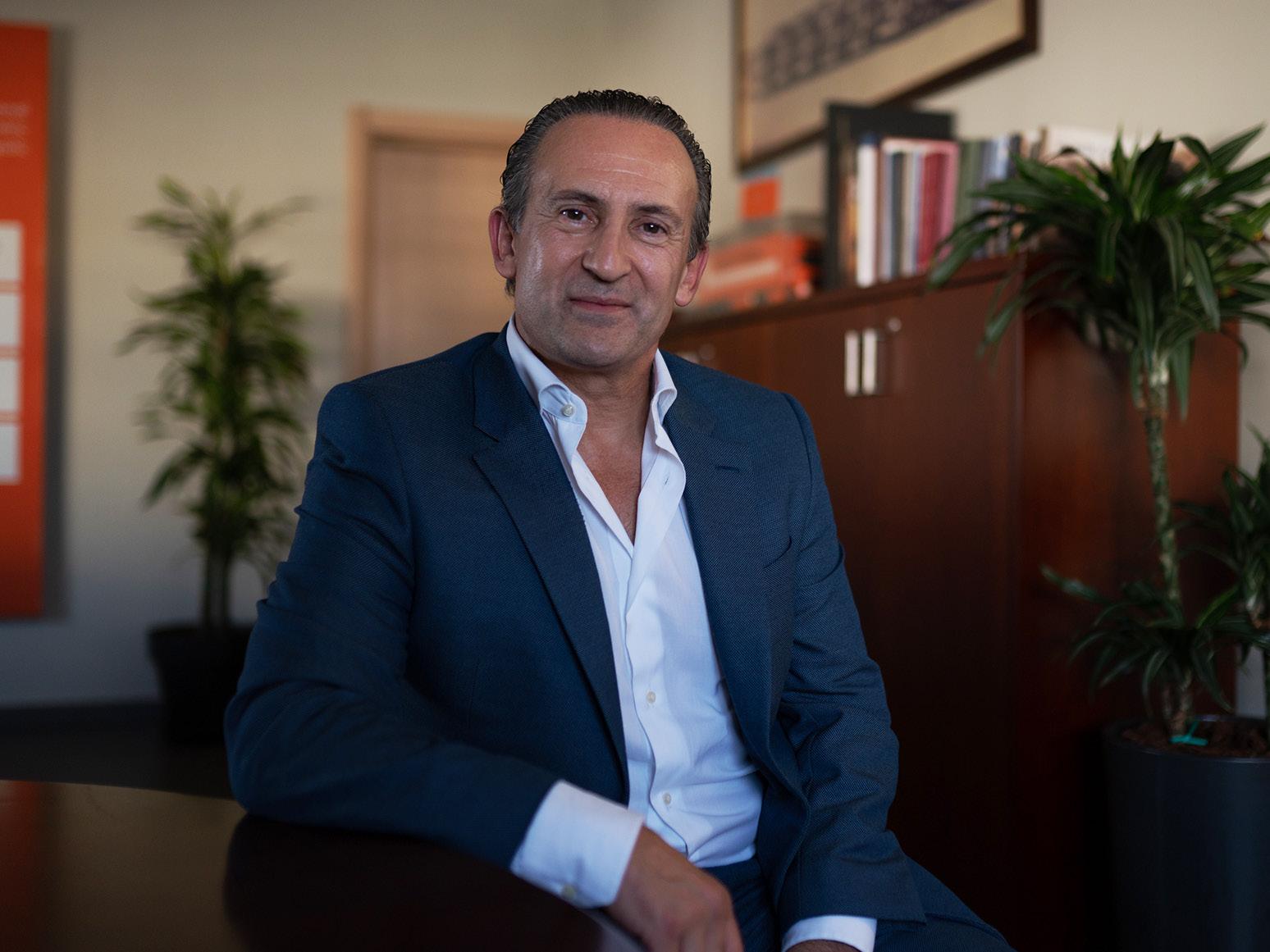
If Brent crude oil continues its upward trajectory or if shipping lines carrying trailers on Ro-Ro (roll on, roll off) continue increasing their prices for trailers carrying cargo to the island, goods will continue to cost more, Franco Azzopardi from Express Trailers said. “In that case, the gap between consumer prices of goods in Malta compared even to Sicily will only continue to widen,” he added. Brent oil prices are currently hovering at around US$90 per barrel, having topped US$122 in May. Prices in recent months are close to a 10-year high.
Malta’s rate of inflation has topped 6 per cent this year and has been trending upward since late 2021.
Transport costs, which constitute a major sector when measuring inflation according to EU criteria, have also skyrocketed, registering a 6.7 per cent annual rate of inflation as of July.
According to National Statistics Office data, imports of consumer goods were up by just over 20 per cent between January and June, when compared to the same period last year. The value of such imports reached €894.9 million, according to June 2022 data.
DISAPPOINTMENT WITH EU REGULATION Azzopardi also expressed his disappointment at the way the country has been “severely shortchanged” when it comes to connectivityrelated issues at EU level.
“These regulations all work against Malta and they not only load operators with added burdens but have created more issues due to lack of people that can be employed and more C0² emissions,” he said.
And although Sicily, like Malta, is further from mainland Europe than the rest of the other European Union countries, its importers and exporters are not as disadvantaged because the Italian government subsidises ferry costs to and from Italy’s ports.
“There is another huge competitive disadvantage for Malta… the massive subsidies that the Italian-Sicilian importers or exporters benefit from, which are not available to Maltese importers and exporters, a fact which, then, negatively affects our consumers,” the CEO said.
Operators in mainland Europe are also eligible for incentives, unlike their Maltese counterparts.
“My gut feeling is that perhaps the local authorities have not been sensitive or sensitised to this reality.
“From the point of view of government, I do not think that Malta’s government is in a position to afford grants or subsidies to Maltese importers and exporters hard-hit by this double whammy,” the CEO said. Times of Malta has contacted the government for a comment but no reply was forthcoming at the time of writing.
Azzopardi believes the way forward would be a form of “consideration towards this effect in the public service obligation agreement which the government signs with the shipping lines connecting Malta to mainland Europe.
“Until then, Maltese consumers, service providers, importers, exporters and all affected in commerce will remain disadvantaged in a massive way,” he said.
In recent months, local importers have expressed concern over the increase in transportation costs that is translating into shortages and further price hikes. On its part, the government has repeatedly said it is doing its part by intervening to keep prices stable in the energy and fuel market.
HR professionals are constantly bombarding us with how vital it is to retain loyalty and performing employees, and how staff turnover can disrupt the business, thus causing ripple effects that take considerable time to overcome. The truth is that it’s an ongoing battle against different elements attacking from all possible angles and sides, says Mark Aquilina, founder and Chief Visionary Officer at NOUV.
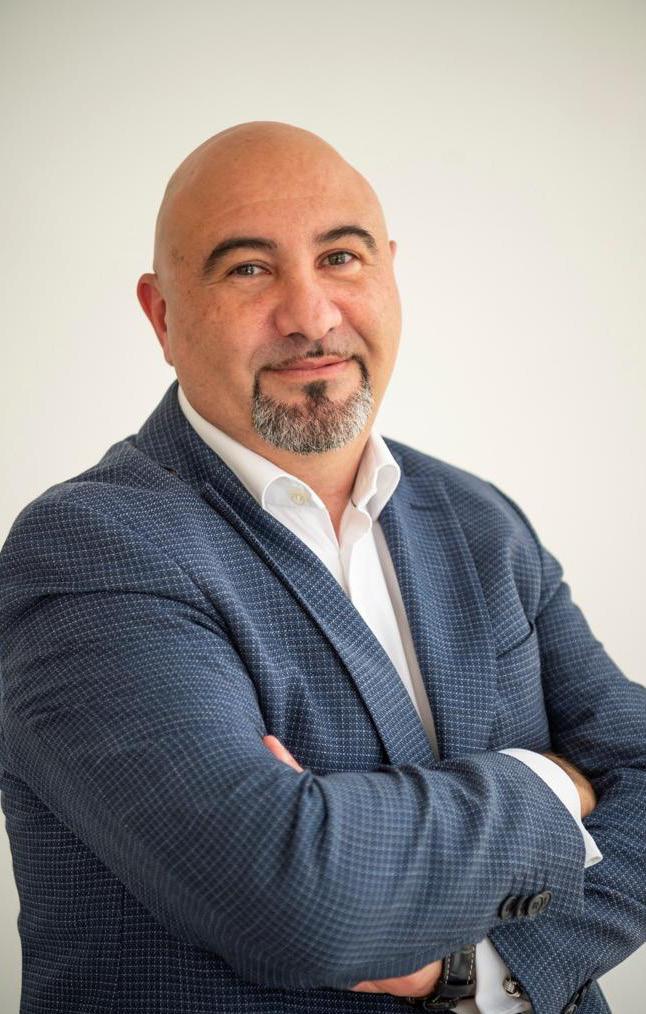
We all know there is a cost to staff turnover, not just monetary. It drains people’s morale, loads other employees with more work, and disrupts internal leadership.
We have seen the world change considerably over the past two years, but the world has also changed many people. I know this even from looking at myself. We are different, and we see things differently. So, it is understandable that many are re-evaluating themselves and what they want, not only from a professional point of view but also from life.
In the US, recent research has found that 40 per cent of workers plan to leave their jobs –
roughly two out of five employees confirmed they are considering leaving their job over the next three to six months. The same research also found that the rate of those quitting or resigning from their job is 25 per cent higher than pre-pandemic levels.
Most likely, the pandemic has re-wired people into viewing the world – and their job – differently. People are switching jobs, moving to completely different industries, moving from traditional to non-traditional roles, retiring early, or starting their business activity. Others are just deciding to quit to be able to travel or rethink their personal life.
I see nothing wrong with this shift. Indeed, I think it is a healthy shift. But as an employer, watching people go remains painful, primarily when you would have invested so much time into nurturing so much potential. It can make an employer feel helpless, used, and abused (within this context). When people you would have considered ‘part of the family’ decide to leave the fold, as an employer, you are left with unanswered questions; did I do enough? Have I taken them for granted? Could I have done more to persuade them to stay?
Asking why is essential. But it is equally important to acknowledge that, ultimately, everyone has a personal journey to follow. Even the path I am on may in time, change. Meanwhile, as employers, our responsibility remains to our organisation and those who choose to stay. As employers, we should be driven by this responsibility, and we must realise that we can still do much to retain our people.
Although competition for talent remains high, there seems to be a fundamental mismatch between the demand for
talent and the number of workers willing to apply for the vacant positions. Perhaps employers continue relying on traditional levers to attract and retain people, including salary, designations, and opportunities for advancement. But although finding talent remains a big struggle, I do not think it is enough to settle for those employees who happen to be ‘available’.
I recently came across some research from the Hay Group that found that highly engaged employees are, on average, 50 per cent more likely to exceed expectations than the least-engaged workers. And companies with highly engaged people outperform other companies by 54 per cent in employee retention, 89 per cent in customer satisfaction, and fourfold in revenue growth.
Other research by the London Business School also confirmed that employees who feel welcome to express their authentic selves at work show more commitment and better individual performance.
But even though some employees might, for example, value flexibility at work highly, others could see more value in mental health support, more meaningful work, and career advancement. So as employers, we should start looking beyond current parameters and more deeply at what different workers want and how best to engage them.
While no company or organisation can ever be the best place to work, we also need to admit that even the best places see their talent leave. So as employers, we must feel compelled to see how to improve the chances of our people staying.
I feel that a good start would be to ensure that our organisations remain authentic, where people are allowed to be the best version of themselves, resulting in an environment in which, no matter what the individual
differences are, the sum of these differences defines the company. This approach is a good recipe for nurturing highly engaged employees.
Uncaring and uninspiring leaders can also be a big part of why people leave an organisation. So, a lot of the onus is now being placed on us employers who are being called to engage on a more human level with our employees. We need to understand their expectations, how they want to grow personally and professionally, and whether their values match those of the organisation.
Most of all, and more than ever, as employers and leaders, we are now being called to inspire those around us.
We can achieve this by being more open in our communication, letting others participate more in the leadership and decision-making processes and acknowledging the actual value of flexibility which also requires a show of trust. More trust gives more autonomy, and more autonomy nurtures employees to want to assert their individuality more.
On the more practical side, as employers, we can retain our organisations’ attractiveness by showing our people in absolute terms that they stand to grow. The most effective way to demonstrate this is to help them sharpen their employee value proposition by focusing more on their respective career paths, compensation, and benefits and increasing the organisation’s prestige.
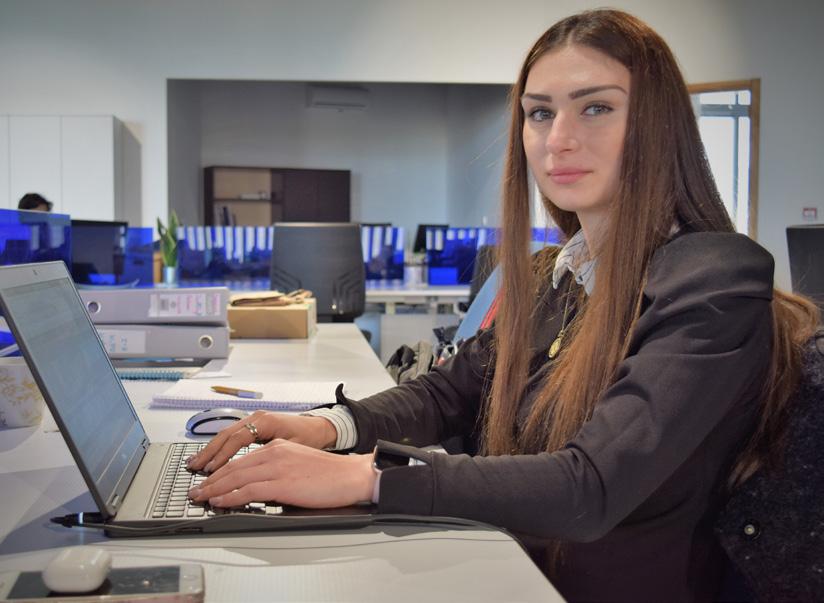
On a less traditional level, we need to keep building a solid company culture, being more creative and personal in how we pursue employees. A job might not necessarily be for life. Still, suppose we, as employers, invest in more meaning, belonging, and a stronger team. In that case, we could develop a unique portfolio of organisational attributes that makes it harder for our people to want to leave.
On the one hand, many workers following this severe pandemic feel freer to envision the jobs they want. Conversely, companies do not have to reinvent their employee value proposition to ensure they are attractive. They could do well by expanding their reach into multiple talent pools creatively and authentically. The employees meant for you will recognise you.



